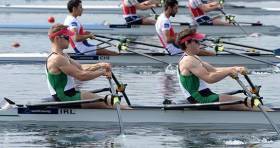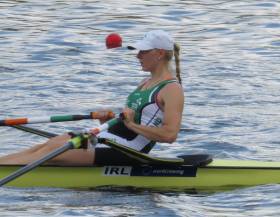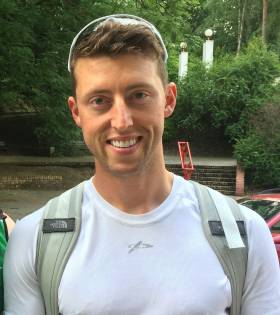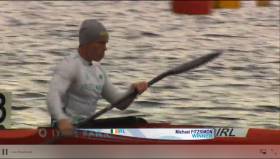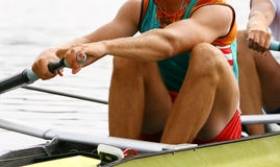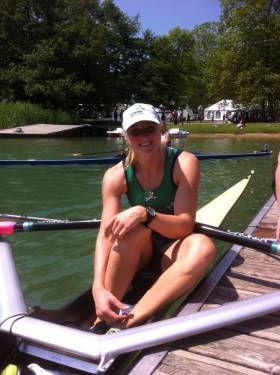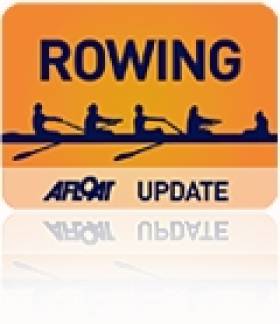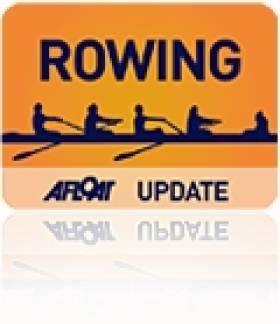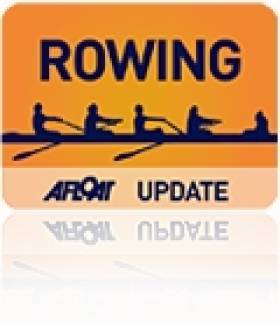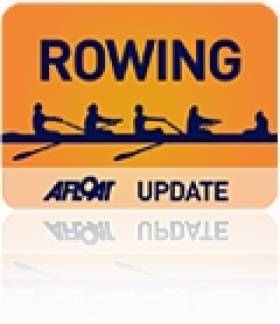Displaying items by tag: A Final
#Rowing: Paul O’Donovan and Gary O’Donovan brought Ireland a second A Final place at the World Cup Regatta in Belgrade as they won their semi-final of the lightweight double sculls. The Skibbereen men moved through the early leaders to lead by halfway and they held the lead to the finish, though Poland closed to within a second on the line. Belgium held off the Czech Republic to take third.
Denise Walsh and Margaret Cremen finished sixth in the second semi-final of the women’s lightweight double. The United States won the race from Switzerland and the Netherlands. The Ireland crew found it hard to make an impression and held sixth from early on.
Sanita Puspure had taken her place in the A Final of the women’s single sculls with second place in her semi-final.
World Cup Regatta, Belgrade, Day Two (Irish interest)
Men
Pair – C Final (Places 13 to 18): 1 Hungary 6:55.35, 2 Greece 6:57.73, 3 Ireland (M O’Donovan, S O’Driscoll) 6:59.0, 4 South Africa 7:00.22.
Lightweight Double Sculls – Semi-Final Two (Three to A Final; rest to B Final): 1 Ireland (G O’Donovan, P O’Donovan) 6:22.28, 2 Poland 6:22.87, 3 Belgium 6:24.21.
Women
Pair – Semi-Final Two (Three to A Final; rest to B Final): 1 Spain 7:35.18, 2 Denmark 7:35.77, 3 Britain Two 7:39.35; 4 Ireland (A Keogh, E Hegarty) 7:42.60.
Double Sculls – Semi-Final (Three to A Final; rest to B Final): Netherlands 7:16.27, 2 Belarus One 7:18.73, 3 Belarus Two 7:23.46; 4 Ireland (A Crowley, M Dukarska) 7:25.60.
Lightweight Double Sculls - Semi-Final (Three to A Final; rest to B Final): 1 United States One 7:03.73, 2 Switzerland 7:05.94, 3 Netherlands 7:06.04; 6 Ireland (M Cremen, D Walsh) 7:24.87.
Single Sculls – Semi-Final (Three to A Final; rest to B Final): 1 Denmark (F Erichsen) 7:24.76, 2 Ireland (S Puspure) 7:25.43, 3 Britain (V Thornley) 7:25.78.
#Rowing: Sanita Puspure took second in her semi-final and qualified for the A Final of the single sculls at the World Cup regatta in Belgrade, Serbia. Denmark’s Fie-Udby Erichsen took over the lead early and won, with Puspure and Kara Kohler of the United States not far behind as they crossed halfway. However, the anticipated move from Vicky Thornley of Britain upset the order. She pushed up beside Puspure, who held on to second. Kohler missed out and finished fourth.
World Cup Regatta, Belgrade, Day Two (Irish interest)
Men
Pair – C Final (Places 13 to 18): 1 Hungary 6:55.35, 2 Greece 6:57.73, 3 Ireland (M O’Donovan, S O’Driscoll) 6:59.0, 4 South Africa 7:00.22.
Women
Pair – Semi-Final Two (Three to A Final; rest to B Final): 1 Spain 7:35.18, 2 Denmark 7:35.77, 3 Britain Two 7:39.35; 4 Ireland (A Keogh, E Hegarty) 7:42.60.
Double Sculls – Semi-Final (Three to A Final; rest to B Final): Netherlands 7:16.27, 2 Belarus One 7:18.73, 3 Belarus Two 7:23.46; 4 Ireland (A Crowley, M Dukarska) 7:25.60.
Single Sculls – Semi-Final (Three to A Final; rest to B Final): 1 Denmark (F Erichsen) 7:24.76, 2 Ireland (S Puspure) 7:25.43, 3 Britain (V Thornley) 7:25.78.
Fifth in A Final for O'Driscoll and O'Donovan
#Rowing: Ireland's Shane O'Driscoll and Mark O'Donovan finished fifth in the A Final of the lightweight double sculls at the World Cup regatta in Poznan, Poland this afternoon. The Irish crew put in a good final third, but they had slipped too far back to find a medal placing. At the head of the field, Britain's Sam Scrimgeour and Joel Cassells came under real pressure from Denmark, but held out, with France taking the bronze medal.
World Cup Regatta, Poznan, Poland (Irish interest; selected results)
Men
Lightweight Pair - Repechage (First Four to A Final; rest to B Final): 1 Ireland (M O'Donovan, S O'Driscoll) 6:36.95, 2 Denmark 6:39.04, 3 Germany 6:42.79, 4 Turkey 6:44.77; 5 Netherlands 6:49.26, 6 Austria 7:05.32. A Final: 1 Britain 6:26.78, 2 Denmark 6:27.66, 3 France 6:29.79; 4 Turkey 6:30.84, 5 Ireland 6:32.14, 6 Germany 6:35.45.
Lightweight Double Sculls - Repechage (First Two to A Final; Rest to B Final): 1 Ireland (G O'Donovan, P O'Donovan) 6:15.08, 2 Britain (W Fletcher, R Chambers) 6:15.22; 3 Germany 6:15.91, 4 Switzerland 6:36.24, 5 Romania.
Women
Lightweight Single Sculls - D Final (Places 19, 20): 1 Ireland (D Walsh) 8:04.66, 2 Thailand (R Raklao) 8:25.85.
Fitzsimon Wins Semi-Final at Olympic Qualifier
#Canoeing: Michael Fitzsimon won his semi-final of the men’s K1 1,000 metres to reach the A Final at the canoe sprint European Olympic Qualifier in Duisburg in Germany. The under-23 competitor can qualify for the Olympic Games if he finishes in the top two in the final.
Canoe Sprint European Olympic Qualifier, Duisburg, Germany (Selected Results, Irish interest)
Men
K1 1,000 – Heat One (Winner to A Final; 2-7 to semi-final; rest out): 4 M Fitzsimon 3:31.693. Semi-Final: 1 Fitzsimon 3:31.453.
K2 200 – Heat One (First Three to A Final; 4-7 to semi-final): 6 T Brennan, B Watkins 34.350. Semi-Final (First Three to A Final; rest out): 5 Brennan, Watkins 34.249.
Women
K1 500 – Heat One (Three to Final; 4-7 to Semi-Final): 5 J Egan 1:55.428. Semi-Final (Three to A Final): 3 Egan 1:52.823.
Paracanoe World Championships, Duisburg
Men - KL3 200- Heat Four (First Seven to Semi-Final): 2 P O’Leary 42.061. Semi-Final One (First Two and next best time to A Final; 3rd, 4th to B Final): 3 O’Leary 41.722.
#Rowing: Mark O’Donovan and Shane O’Driscoll gave Ireland their second A Final place at the European Rowing Championships in Brandenburg in Germany with a second-place finish in this morning’s repechage. The Ireland lightweight pair rowed a brave race. Four boats qualified from six, but it was a battle all the way down the course. O’Donovan and O’Driscoll had a good start and led all the way until the final quarter, where Denmark passed them. The margins were tight for qualification: Poland found themselves edged out by six hundredths of a second by fast-finishing Portugal.
Denise Walsh had earlier qualifed for the A Final of the lightweight single sculls.
European Championships, Brandenburg, Germany – Day Two (Selected results, Irish interest)
Men
Lightweight Pair – Repechage (First Four to A Final; rest to B Final): 1 Denmark 7:26.63, 2 Ireland (M O’Donovan, S O’Driscoll) 7:27.99, 3 Germany 7:29.0, 4 Portugal 7:29.70.
Women
Lightweight Single Sculls – Repechage (First Two to A Final; rest to B Final): 1 Ireland (D Walsh) 8:39.41, 2 Britain (I Walsh) 8:41.08.
Puspure Takes Command and Wins Semi-Final
#Rowing: Sanita Puspure won her semi-final and will compete in the A Final of the single sculls at the World Cup Regatta in Varese in Italy. The Ireland sculler powered into an early lead and never relinquished it. A battle for second and third was won by Tatsiana Kukhta of Belarus and Carling Zeeman of Canada, with Ukraine’s Nataliya Dovgodko missing out and going to the B Final.
World Cup Regatta, Varese – Day Two (Selected Results, Irish interest)
Men
Lightweight Four – C Final (places 13 to 16): 1 Canada One 6:09.73, 2 Serbia 6:11.21, 3 Austria 6:15.85, 4 Ireland (L Seaman, M O’Donovan, L Keane, S O’Driscoll) 6:16.00.
Women
Pair – C Final (places 13 to 16): 1 Norway One 7:22.74, 2 Ukraine 7:23.16, 3 Ireland (L Kennedy, B O’Brien) 7:33.07.
Single Sculls – A/B Semi-Final One (First Three to A Final; rest to B Final): 1 Ireland (S Puspure) 7:26.60, 2 Belarus Two (T Kukhta) 7:27.86, 3 Canada (C Zeeman) 7:29.01; 4 Ukraine 7:30.70, 5 Sweden 7:37.22, 6 Latvia 7:37.48.
Lightweight Double Sculls – C Final (places 13 to 17): 1 Ireland (C Lambe, S Jennings) 7:17.24, 2 Italy Three 7:26.29, 3 Chile 7:29.71.
Lightweight Single Sculls – Repechage (First Two to A Final; rest to B Final): 1 Poland Two 7:49.90, 2 Switzerland One 7:51.76; 5 Ireland Two (S McCrohan) 8:04.69, 6 Ireland One (D Walsh) 8:08.81
Puspure Gives Ireland Third A Finalist in Poznan
#ROWING: Sanita Puspure finished second in her repechage to secure an A Final spot at the European Rowing Championships in Poznan, Poland this morning. Puspure led early on, but the top two places were the key ones, and Puspure and Tatsiana Kukhta of Belarus nailed them down, as Julia Richter of Gernany and Eveline Peleman of Belgium struggled. Ireland wll have three boats in tomorrow's finals, as the men's and women's lightweight double sculls had already qualified.
European Rowing Championships, Poznan, Day Two (Irish interest)
Men
Lightweight Double Sculls – A/B Semi-Final One (Three to A Final; rest to B Final): 1 Britain (R Chambers, W Fletcher) 6:16.83, 2 Norway 6:21.02, 3 Ireland (P O’Donovan, G O’Donovan) 6:22.89; 4 Czech Republic 6:27.58, 5 Austria 6:31.75, 6 Greece 6:41.41.
Women
Pair – A/B Semi-Final One (Three to A Final; rest to B Final): 1 Netherlands 7:05.80, 2 Romania 7:09.40,3 France 7:13.10; 4 Czech Republic 7:14.97, 5 Ireland (L Kennedy, M Dukarska) 7:30.00, 6 Germany 7:34.45.
Lightweight Double Sculls – A/B Semi-Final One (Three to A Final; rest to B Final): 1 Poland 6:58.39, 2 Denmark 7:02.24, 3 Ireland (C Lambe, D Walsh) 7:02.82; 4 Russia 7:02.99, 5 Romania 7:03.82, 6 Czech Republic 7:17.73.
Single Sculls – Repechage (First Two to A Final; rest to B Final): 1 Belarus 7:32.81, 2 Ireland (S Puspure) 7:36.20; 3 Germany 7:40.65, 4 Belgium 7:47.19.
Lightweight Single Sculls – A/B Semi-Final One (Three to A Final; rest to B Final): 1 Russia 7:42.99, 2 Lithuania 7:44.09, 3 Britain (I Walsh) 7:44.62; 4 Ireland (S Jennings) 7:45.99, 5 Austria 7:58.39, 6 Latvia 8:02.81.
O'Donovan Fourth in Record-Breaking World Rowing Final
#ROWING: Paul O’Donovan finished fourth in an extraordinarily-fast A Final of the lightweight single sculls at the World Rowing Championships in Amsterdam today. The race winner, Marcello Miani of Italy, set the world’s best time, and second-placed Lars Hartig of Germany also finished inisde the old record in the tailwind conditions. O’Donovan (20) was the slowest over the first 500 metres. He came from behind to pick off Pedro Fraga of Portugal and Perry Ward of Australia, but even his outstanding speed in the closing stages could not bridge the gap to Michael Schmid of Switzerland, who took bronze.
The world's best time had earlier been breached by American Andrew Campbell Junior of the United Sates in the C Final, but Miani and Hartig bettered it again.
World Rowing Championships, Amsterdam, Day Six (Irish interest, selected results)
Men
Lightweight Four – Semi-Final (First Three to A Final): 1 Denmark 5:43.16 (world best time), 2 Britian (M Aldred, P Chambers, R Chambers, C Bartley) 5:43.97, 3 New Zealand 5:47.95.
Lightweight Pair – B Final (Places 7 to 12): 1 China (Zhenwei Hou, Fangbing Zhang) 6:28.29, 2 Bulgaria 6:30.40, 3 Netherlands 6:31.01, 4 Ireland (M O’Donovan, N Kenny) 6:34.06, 5 Austria 6:37.65, 6 Chile 6:43.01.
Lightweight Single Sculls – A Final: 1 Italy (M Miani) 6:43.37, 2 Germany (L Hartig) 6:46.73, 3 Switzerland (M Schmid) 6:50.88; 4 Ireland (P O’Donovan) 6:50.88, 5 Australia 6:59.84, 6 Portugal 7:07.94.
Women
Four – B Final (Places 7 to 10): 1 Netherlands 6:28.95, 2 Italy 6:35.51, 3 Germany 6:37.90, 4 Ireland (M O’Neill, E Tormey, A Keogh, B O’Brien) 6:43.62.
Double – A/B Semi-Final (First Three to A Final; rest to B Final) 1 Australia (O Aldersey, S Kehoe) 6:37.31 (new World Best Time), 2 Lithuania (D Vistartaite, M Valciukaite) 6:30.34, 3 New Zealand (F Bourke, Z Stevenson) 6:43.34; 4 Netherlands 6:46.40, 5 Ukraine 6:59.20, 6 Ireland (H Hannigan, M Dukarska) 7:14.75.
Lightweight Double Sculls – C Final (Places 13 to 18): 1 Russia (D Stepochkina, O Arkadova) 6:58.21, 2 Ireland (C Lambe, D Walsh) 7:00.11, 3 Denmark 7:03.49, 4 Switzerland 7:03.51, 5 Belarus 7:09.08, 6 Greece 7:14.20.
Single – A/B Semi-Final (First Three to A Final; rest to B Final)
Ireland (S Puspure): 1 New Zealand (E Twigg) 7:18.68, 2 Austria (M Lobnig) 7:23.93, 3 Ireland (S Puspure) 7:25.61; 4 United States 7:29.18, 5 Lithuania 7:33.09, 6 Czech Republic 7:43.150.
Puspure Masters Choppy Waters to Take Place in World Rowing A Final
#ROWING: Sanita Puspure secured an A Final place for Ireland with an admirable performance in difficult conditions in the semi-final of the women’s single sculls at the World Championships in Amsterdam today. Puspure fought her way into third place behind the impressive Emma Twigg of New Zealand and Magdalena Lobnig of Austria early on and held this down the course in choppy water. She refused to yield to a strong challenge from Genevra Stone of the United States and closed up on Lobnig in the run to the line.
The Ireland women’s double of Helen Hannigan and Monika Dukarska finished sixth in a record-breaking semi-final. Sally Kehoe and Olympia Aldersey of Australia won in a new world’s best time. Ireland started quite well, but were not in real contention for a place in the A Final.
There was also a new record in the lightweight men’s four semi-final. Denmark ousted their own country’s great crew of the 1990s from the record books while second-placed Britain, with the Chambers brothers, Peter and Richard, in the two and three seats, also came in under the old record.
World Rowing Championships, Amsterdam, Day Six (Irish interest, selected results)
Men
Lightweight Four – Semi-Final (First Three to A Final): 1 Denmark 5:43.16 (world best time), 2 Britian (M Aldred, P Chambers, R Chambers, C Bartley) 5:43.97, 3 New Zealand 5:47.95.
Lightweight Pair – B Final (Places 7 to 12): 1 China (Zhenwei Hou, Fangbing Zhang) 6:28.29, 2 Bulgaria 6:30.40, 3 Netherlands 6:31.01, 4 Ireland (M O’Donovan, N Kenny) 6:34.06, 5 Austria 6:37.65, 6 Chile 6:43.01.
Women
Four – B Final (Places 7 to 10): 1 Netherlands 6:28.95, 2 Italy 6:35.51, 3 Germany 6:37.90, 4 Ireland (M O’Neill, E Tormey, A Keogh, B O’Brien) 6:43.62.
Double – A/B Semi-Final (First Three to A Final; rest to B Final) 1 Australia (O Aldersey, S Kehoe) 6:37.31 (new World Best Time), 2 Lithuania (D Vistartaite, M Valciukaite) 6:30.34, 3 New Zealand (F Bourke, Z Stevenson) 6:43.34; 4 Netherlands 6:46.40, 5 Ukraine 6:59.20, 6 Ireland (H Hannigan, M Dukarska) 7:14.75.
Lightweight Double Sculls – C Final (Places 13 to 18): 1 Russia (D Stepochkina, O Arkadova) 6:58.21, 2 Ireland (C Lambe, D Walsh) 7:00.11, 3 Denmark 7:03.49, 4 Switzerland 7:03.51, 5 Belarus 7:09.08, 6 Greece 7:14.20.
Single – A/B Semi-Final (First Three to A Final; rest to B Final): 1 New Zealand (E Twigg) 7:18.68, 2 Austria (M Lobnig) 7:23.93, 3 Ireland (S Puspure) 7:25.61; 4 United States 7:29.18, 5 Lithuania 7:33.09, 6 Czech Republic 7:43.150.
In-Form Puspure Makes Second Successive Championship Final
#ROWING: Ireland’s Sanita Puspure qualified for her second successive championship final by finishing third in her semi-final at the World Cup regatta in Aiguebelette in France. Emma Twigg of New Zealand, who won gold at the first World Cup regatta in Sydney, won this sem-final convincingly, with Genevra Stone of the United States and Puspure taking the other A Final qualification spots. Puspure started well and led early on. When Stone came through she and Stone swapped second and third, staying clear of the rest of the field.
World Cup Regatta, Aiguebelette, France, Day Two (Selected Results, Irish interest)
Men
Single Sculls – D Final (Places 19 to 23): 1 Bulgaria 7:14.01, 2 Ireland (J Keohane) 7:16.48, 3 China 7:19.41.
Lightweight Single Sculls – Semi-Final Two (First Three to A Final; rest to B Final): 1 Germany Two (J Schoemann-Finck) 7:00.71, 2 Bulgaria (V Nedelcho) 7:03.69, 3 France (D Piqueras) 7:04.23; 4 Ireland One (P O’Donovan) 7:06.99, 5 Switzerland One 7:14.8, 6 Algeria 7:21.36. C Final (places 13 to 18): 1 Ireland Two (M O’Donovan) 7:17.11, 2 Tunisia One 7:17.40, 3 Switzerland Two 7:19.58.
Women
Pair – A/B Semi-Final One (First Three to A Final; rest to B Final):
1 United States Three (V Opitz, M Musnicki) 7:02.27, 2 United States One (M Kalmoe, K Simmonds) 7:02.33, 3 United States Four (A Polk, L Schmetterling) 7:04.23; 4 Canada 7:07.94, 5 Ireland (L Kennedy, L Dilleen) 7:16.80, 6 France 7:32.46.
Double Sculls – C Final (Places 13, 14): 1 France 7:12.84, 2 Ireland (M Dukarska, E Moran) 7:20.78.
Lightweight Double Sculls – A/B Semi-Final One (First Three to A Final; rest to B Final): 1 Britain (I Walsh, K Copeland) 7:05.84, 2 China One (Tianyu Teng, Wenyi Huang) 7:07.25, 3 Sweden (C Lilja, E Fredh) 7:08.90; 4 Australia 7:13.07, 5 China Two 7:13.17, 6 Ireland (C Lambe, D Walsh) 7:14.79.
Single Sculls – A/G Semi-Final Two (First Three to A Final; rest to B Final): 1 New Zeland (E Twigg) 7:27.30, 2 United States (G Stone) 7:33.02, 3 Ireland (S Puspure) 7:33.79; 4 Germany 7:38.42, 5 Switzerland 7:42.76, 6 France 7:44.20
Pararowing: ASM1X - B Final: 4 Ireland (T Kelly) 5:42.41.



























